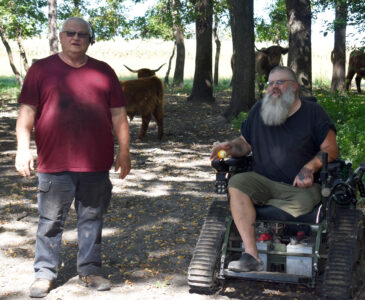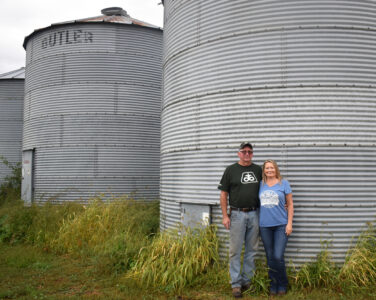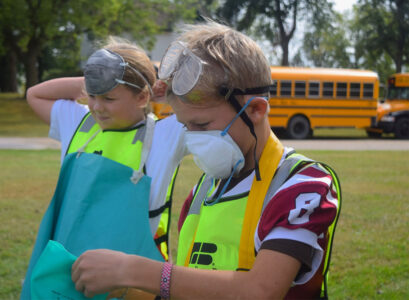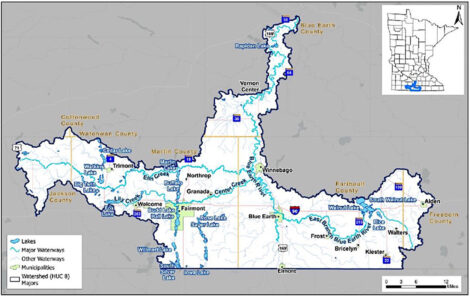In split vote, Council OKs 8.2% levy hike
FAIRMONT– After a lengthy discussion about vehicle replacement, the Fairmont City Council on Monday set the preliminary 2026 budget and tax levy at a 8.2 percent, or $612,000, levy increase. The council will not set the official budget and levy– which can be decreased but not increased– until its truth in taxation meeting in December.
The council previously had two workshops to discuss the budget on Aug. 25 and Sept. 8. Fairmont’s Finance Director, Paul Hoye, explained what some of the biggest changes are this year.
“Some of the things that drove the proposed levy increase for 2026 really relate to personnel costs. Seventy percent of our general fund is related to personnel. Cost of insurance, COLA increases. We had a new law for paid family leave that we have to comply with… All of that for personnel costs is about $300,000,” Hoye explained.
He said the legal budget has also increased about $70,000, as the council previously discussed at a budget workshop.
Hoye shared that about $100,000 of interest earnings came in for additional revenue which helped offset another $100,000 that could have gone to the levy increase.
However, some other things that led to the levy increase include the street improvement program, which the council has been putting extra money aside for in recent years.
“The plan is by 2030 we’ll have $2.5 million in revenue coming in each year for street improvements and that’s to help with the backlog that we have for the streets that need to be repaired,” Hoye said.
With that said, $100,000 of the levy will go toward street improvements.
Moving to the main discussion item, Hoye said that Public Works Director Matthew York has been working on putting together a comprehensive list of all of the fleet vehicles, per council’s request.
“The council wanted to see the vehicles in our fleet, how old they are and how much it’s going to cost to replace them and anticipated life expectancy of the vehicles. Matt put together a comprehensive list and a policy that we’ll be bringing forth to the council as far as equipment replacement and setting the guidelines of when we would replace equipment,” Hoye said.
He said that if the new policy is followed, about $4.6 million in equipment is past the replacement schedule. Therefore, there’s $100,000 going to the capital project levy to help fund future equipment purchases.
A dump truck was mentioned that is past the equipment replacement schedule, but Hoye said it’s in good condition and they might be able to extend the life of it.
Hoye also included a chart of levy increases for other cities, either nearby or of a similar size, for comparison.
In closing, Hoye said, “We are looking at ways to find some savings and hopefully lower that levy in December.”
After Hoye’s presentation, Interim City Administrator, Jeff O’Neill, said, “There really is a pattern in Minnesota of higher levies than we’re used to… there’s a lot of pressure with inflation.”
Council Member Britney Kawecki thanked Hoye for preparing more details with the budget, but also voiced dissatisfaction with some of the end results.
At the previous budget workshops, Kawecki had shared that she reached out to other comparable communities, like New Ulm, to find out how many city vehicles they have and what their replacement schedule is.
“Last meeting I brought forth the data to show that New Ulm, population 14,000 people, has a much smaller fleet than the city of Fairmont. Yes, cities do use their equipment differently… but I do believe… that the city of Fairmont, instead of getting rid of equipment and replacing it with new, we stockpile equipment,” Kawecki said.
She said that the city of Fairmont has 17 dump trucks, while New Ulm has 10. She noted that New Ulm’s are newer and Fairmont’s are older. Kawecki said that when looking at the log of Fairmont’s equipment, it’s used very minimally.
Kawecki also voiced dissatisfaction with York’s proposed vehicle replacement policy.
“I asked citizens to review the budget. It didn’t go so well. I’m asking the council to take a step back. I’m asking the council to support a motion to hold on all vehicles and equipment in 2026 until we can come up with a vehicle replacement strategy and put in reserves for $200,000 for emergency vehicle replacement and/or rentals,” Kawecki said.
Finally, Kawecki said that while for the past few years the council has been saying it will budget differently, nothing’s ever been pulled from a budget.
Hoye shared that there were a few changes from what the city originally had in its capital improvement plan and what it’s now looking at for 2026. He said that two trucks, park vehicles, worth $115,000, were removed from the budget.
He added that the plan is also to push back a resurfacing project, worth $165,000 in liquor store funds, at the Fairmont Aquatic Park, as well as a sand filtering project. While both need to be done, Hoye said they could wait a year.
Council Member Randy Lubenow said he did not think a 35-year-old dump truck is essential to the operation of the city.
“If council as a whole is going to continue to approve everything that’s in the budget, I don’t think we’re gaining any ground,” Lubenow said.
Council Member James Kotewa asked Hoye about the proposed levy for 2025 as well as the actual levy that was adopted. Hoye said he knows the actual levy was lowered from the preliminary in 2025 and that would be the goal for this year, too. He later said the preliminary 2025 levy was a 9.1 percent increase but the council adopted the budget and levy at a 7.9 percent increase, which was a reduction of $82,000.
“We spend a lot of time to make sure that we have the budget in place and as close to what we think we need as possible,” Hoye said.
Council Member Jay Maynard said that every year the council has been “kicking the can down the road.” He agreed that a vehicle replacement policy should be created, but said the needs of the current fleet should not be put on hold in the meantime.
Mayor Lee Baarts spoke up and said that he would agree that the council often sits back and lets a purchases go through.
“I don’t think there’s a problem telling them no every once in a while on some item… I agree that there are some items on there that I think we could do without for a year,” Baarts said.
Kawecki pointed out that she was proposing to get rid of some of the unused vehicles as the plan council received showed a lot of vehicles are not in use.
“We need to be analyzing our fleet for use. We need to figure out what we don’t need because then we can replace what we have,” Kawecki said.
Public Works Director Matthew York gave an explanation on the rotation and how some of the vehicles in question are used. He said the city has prioritized same-day snow removal, whereas the city of New Ulm takes a different approach.
“While I do agree with the fact that we need to look at our spending, I do agree with certain aspects of all the conversations that were had today. I also agree with the fact that we are the behind. Stopping purchase today I think would be a detriment to the fleet in the future,” York said.
After an hour of discussion, Kawecki called for a vote. Kotewa asked how the motion would affect the levy. Hoye said the motion would not change the levy, just freeze capital purchases. Kawecki said she would like to amend her motion.
“I think we should spend the time between now and December to see what impact that has on our operations so the council can make an informed decision,” Hoye suggested.
However, Kawecki said it would just be for a year and per her earlier motion, $200,000 would still be set aside for emergency vehicle replacement.
She ended up amending her motion to reduce the levy by putting a hold on all vehicle and equipment purchases through 2026 with $200,00 in reserves for emergency purchases and/or repairs and rentals as needed until and so that the city can work on a more thorough and vetted vehicle replacement plan.
Hoye asked if the motion could include an amount that the levy would be reduced by.
York reminded Kawecki and the council that the 8.2 percent levy cannot be raised, only lowered in December. He suggested leaving it as is and giving staff the next few months to work on the recommendation and thus lowering the levy.
Kawecki attempted to tweak her motion, but Hoye said he would feel more comfortable if the council would give an amount to reduce the levy by.
Lubenow said he would say the levy should be reduced by $400,000, however it was pointed out there was already a motion on the floor.
When Kawecki’s motion was called for a vote, it received a second from Lubenow. In a roll call vote it failed 3-2 with Kotewa, Maynard and Council Member Wayne Hasek voting no.
Lubenow then made a motion to remove the 35-year-old dump truck from the preliminary budget. Kawecki asked whether Lubenow would approve an amendment to reduce the levy by $400,000 and he said yes.
Lubenow then amended his motion to simply reduce the levy by $400,000. It was seconded by Kawecki.
However, Hoye said, “I caution the council from making a rash decision here and allow us a little more time to analyze what that means. Four-hundred-thousand is a huge cut without knowing what that means.”
He said if the levy was left as is, it could be cut down more in December.
In a roll call vote, the motion failed 3-2.
Kotewa then said, based on the recommendation from Paul (Hoye), he would make a motion to approve the proposed property tax levy for 2026. The motion passed 3-2 with Kawecki and Lubenow opposed.
Maynard then made a motion to approve the proposed budget for 2026. The motion passed 3-2 with Kawecki and Lubenow opposed.




